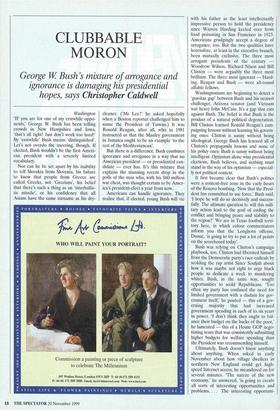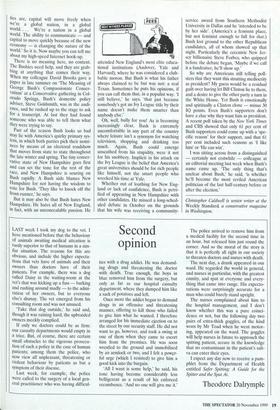CLUBBABLE MORON
George W Bush's mixture of arrogance and ignorance is damaging his presidential hopes, says Christopher Caldwell
Washington `IF you are for one of my erstwhile oppo- nents,' George W. Bush has been telling crowds in New Hampshire and Iowa, `that's all right! Just don't work too hard!' By 'erstwhile' Bush means 'distinguished'. Let's not overdo the sneering, though. If elected, Bush wouldn't be the first Ameri- can president with a severely limited vocabulary.
Nor can he be set apart by his inability to tell Slovakia from Slovenia, his failure to know that people from Greece are called Greeks, not 'Grecians', his belief that there's such a thing as an 'interballis- tic missile', or his confidence that all Asians have the same surname as his dry- cleaner. (`Mr Lee?' he asked hopefully when, a Boston reporter challenged him to name the President of Taiwan.) It was Ronald Reagan, after all, who in 1981 instructed us that the Manley government in Jamaica ought to be an example `to the rest of the Mediterranean'.
But there is a difference. Bush combines ignorance and arrogance in a way that no American president — or presidential can- didate — ever has. It's this mixture that explains the stunning recent drop in the polls of the man who, with his $60 million war chest, was thought certain to be Amer- ica's president-elect a year from now.
Americans can handle ignorance. They realise that, if elected, young Bush will vie with his father as the least intellectually impressive person to hold the presidency since Warren Harding keeled over from food poisoning in San Francisco in 1923. Americans grudgingly accept a degree of arrogance, too. But the two qualities have heretofore, at least in the executive branch, been mutually exclusive. The three most arrogant presidents of the century Woodrow Wilson, Richard Nixon and Bill Clinton — were arguably the three most brilliant. The three most ignorant — Hard- ing, Reagan and Bush — were all-round affable fellows.
Washingtonians are beginning to detect a 'gravitas gap' between Bush and his nearest challenger, Arizona senator (and Vietnam war hero) John McCain. It's a gap that cuts against Bush. The belief is that Bush is the product of a natural political degeneration. Bill Clinton learned Ronald Reagan's cam- paigning lessons without learning his govern- ing ones: Clinton is sunny without being ideological. George Bush has learned all of Clinton's propaganda lessons and none of his policy ones: Bush is sunny without being intelligent. Optimism alone wins presidential elections, Bush believes, and nothing must stand in the way of his optimism — especial- ly not political content.
It first became clear that Bush's politics were a content-free zone in the early hours of the Kosovo bombing. 'Now that the Presi- dent has committed to use force,' Bush said, 'I hope he will do so decisively and success- fully. The ultimate question is: will this mili- tary action lead to the goal of ending the conflict and bringing peace and stability to the region?' We are in Texas football terri- tory here, in which colour commentators inform you that the Longhorn offense, Duane, 'is going to try to put a lot of points on the scoreboard today'.
Bush was relying on Clinton's campaign playbook, too. Clinton had liberated himself from the Democratic party's race-radicals by scolding the rap artist Sister Souljah about how it was maybe not right to urge black people to dedicate a week to murdering whites. Bush, in the same way, sought opportunities to scold Republicans. 'Too often my party has confused the need for limited government with a disdain for gov- ernment itself,' he pouted — this of a gov- erning majority that had increased government spending in each of its six years in power. 'I don't think they ought to bal- ance their budget on the backs of the poor,' he lamented — this of a House GOP nego- tiating team that was consistently submitting higher budgets for welfare spending than the President was recommending himself.
Ultimately, Bush doesn't know anything about anything. When asked in early November about how village dwellers in northern New England could get high- speed Internet access, he meandered on for several minutes. 'The nature of the new economy,' he answered, 'is going to create all sorts of interesting opportunities and problems.... The interesting opportuni- ties are, capital will move freely when we're a global nation, in a global world.. .. We're a nation in a global world. The ability to communicate — and capital to move quickly because of the new economy — is changing the nature of the world.' So it is. Now maybe you can tell me about my high-speed Internet hook-up. There is no meaning here, no content. The Bushies need help, and they are grab- bing at anything that comes their way. When my colleague David Brooks gave a paper in late summer on 'The Meaning of George Bush's Compassionate Conser- vatism' at a Conservative gathering in Col- orado Springs, Bush's domestic policy adviser, Steve Goldsmith, was in the audi- ence, and he rushed up to the stage to ask for a transcript. At last they had found someone who was able to tell them what they were trying to say. Part of the reason Bush looks so bad may lie with America's quirky primary sys- tem, in which both parties pick their nomi- nees by means of an electoral roadshow that moves from state to state throughout the late winter and spring. The tiny conser- vative state of New Hampshire goes first and can set the tone for the rest of the lace, and New Hampshire is souring on Bush rapidly. A Bush aide blames New Hampshire for not having the wisdom to vote for Bush. 'They like to knock off the front-runner,' he says.
But it may also be that Bush hates New Hampshire. He hates all of New England, in fact, with an unconcealable passion. He attended New Eng and's most elite educa- tional institutions (Andover, Yale and Harvard), where he was considered a club- bable moron. But Bush is what his father always claimed to be but was not: a real Texan. Sometimes he puts his opinions, if you can call them that, in a populist way. 'I still believe,' he says, 'that just because somebody's got an Ivy League title by their name doesn't make them smarter than anybody else.'
Oh, well, bully for youl As is becoming increasingly clear, Bush is extremely uncomfortable in any part of the country where leisure isn't a synonym for watching television, shopping and drinking too much. Again, Bush could emerge unscathed from his stupidity, were it not for his snobbery. Implicit in his attack on the Ivy League is the belief that America's great universities should be for rich people like himself, not the smart people who wrecked his time at Yale.
Whether out of loathing for New Eng- land or lack of confidence, Bush is petri- fied of appearing in New Hampshire with other candidates. He missed a long-sched- uled debate in October on the grounds that his wife was receiving a community-
service award from Southern Methodist University in Dallas and he 'intended to be by her side'. (America's a feminist place, but not feminist enough to fall for that.) Bush lost ground to the other Republican candidates, all of whom showed up that night. Particularly the eccentric New Jer- sey billionaire Steve Forbes, who quipped before the debate began, 'Maybe if we call it a fundraiser, he'll show up.'
So why are Americans still telling poll- sters that they want this strutting mediocrity as president? My guess would be a residual guilt over having let Bill Clinton lie to them, and a desire to give the other party a turn in the White House. Yet Bush is emotionally and spiritually a Clinton clone — minus 30 IQ points. Even Bush's supporters don't have a clue why they want him as president. A recent poll taken by the New York Times and CBS showed that only 61 per cent of Bush supporters could come up with a 'spe- cific reason' for their support, and that 61 per cent included such reasons as 'I like him' or 'He can win'.
I was sitting across from a distinguished — certainly not erstwhile — colleague at an editorial meeting last week when Bush's name came up. 'The only thing that's unclear about Bush,' he said, 'is whether he'll become the most reviled American politician of the last half-century before or after the election.'
Christopher Caldwell is senior writer at the Weekly Standard, a conservative magazine in Washington.



























































































 Previous page
Previous page